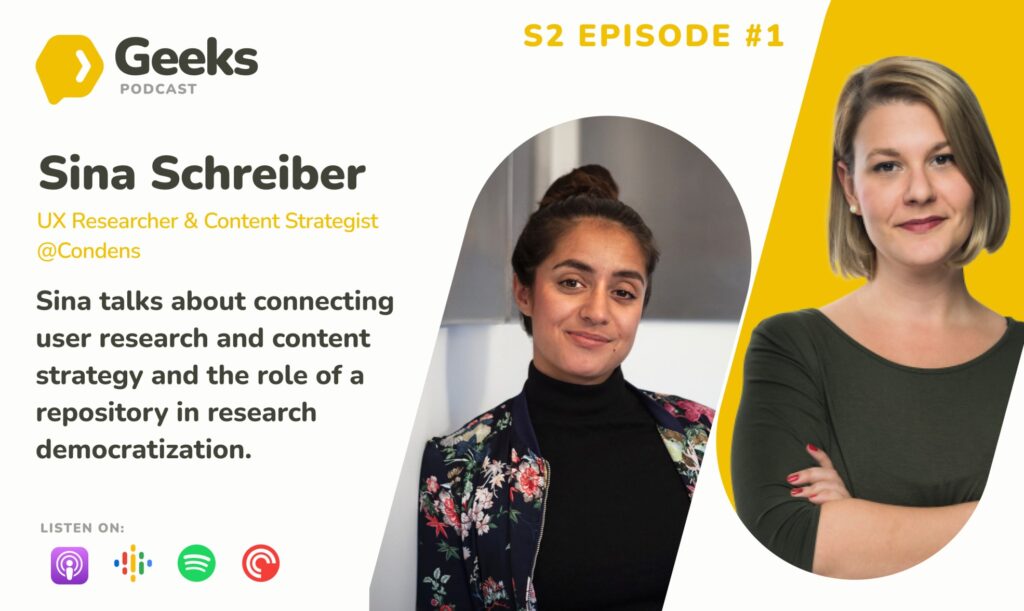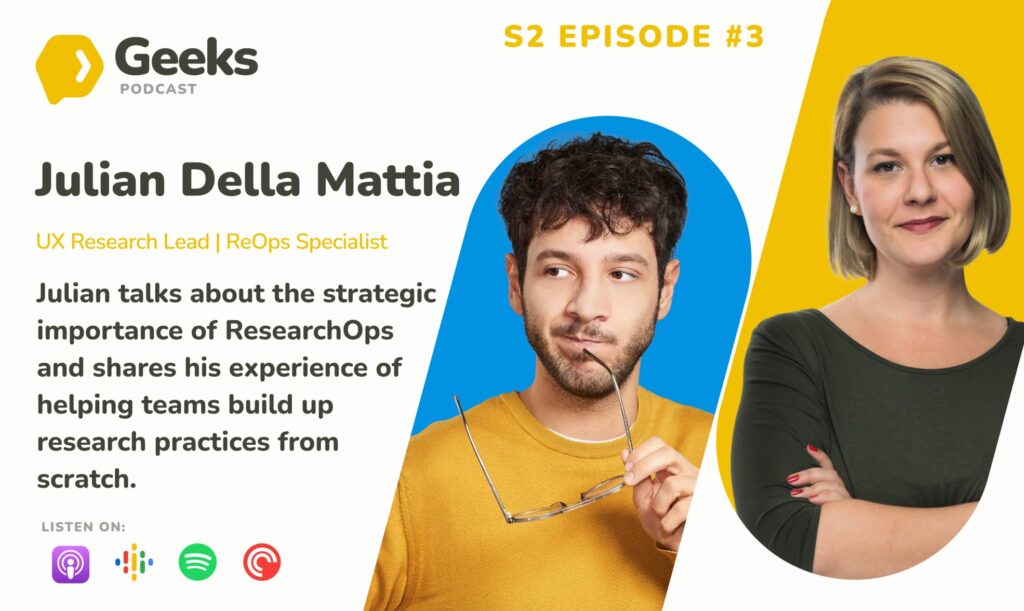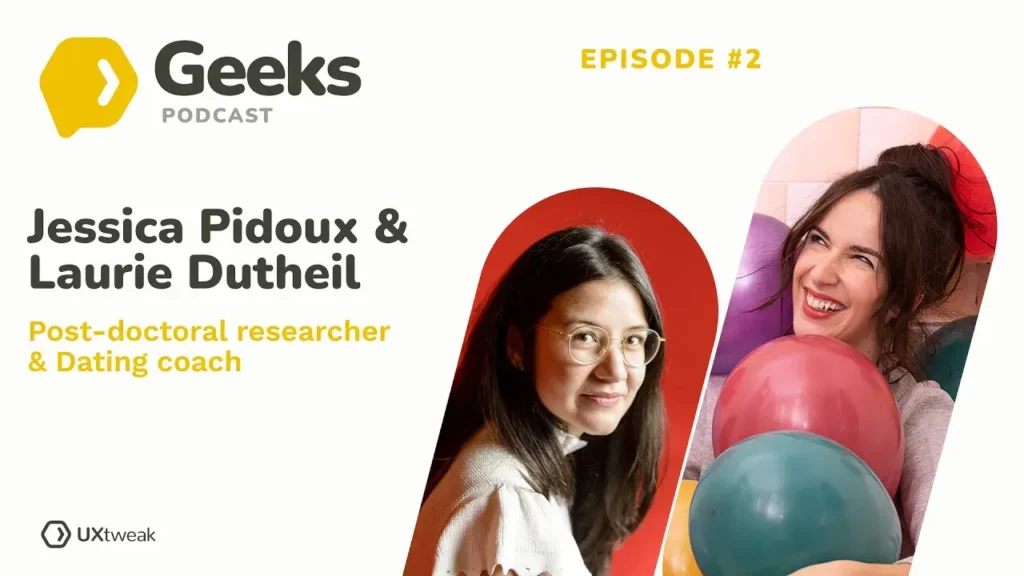In this episode, Pamela explores the complex relationships between cultural perceptions and financial psychology.
Episode highlights
- 00:00:01 Guest introduction
- 00:05:19 Cultural differences in research
- 00:09:22 Financial priorities in Mexico
- 00:22:51 Research in Latin America
- 00:27:58 Conclusion
About our guest Pamela Escobar
Born in Cancun, Mexico, Pamela is a bicultural User experience designer with seven years of experience helping companies with cross-cultural products understand complex problems and create innovative solutions. She specializes in generating impactful insights through comprehensive quantitative and qualitative research, and enhancing products and services through a human-centric approach. She’s passionate about psychology, traveling, food, as well as deep wholehearted conversations. Currently working as a freelancer traveling around the world while researching it, and during her free time enjoying local cuisine or doing water sports back home in Cancun.
Podcast transcript
[00:00:00] Tina Ličková:
Welcome to UX Research Geeks, where we geek out with researchers from all around the world on topics they are passionate about. I’m your host Tina Ličková, a researcher and a strategist, and this podcast is brought to you by UXtweak, an all-in-one UX research tool.
This is usually the place where you hear me to read out the introduction that my beautiful producer Jana always prepares for me. But as this conversation is so juicy, I just want to point out that I met Pamela here in Vienna at the UX Vienna meetup and she started to speak. She just basically made the room shine.
And I feel like the whole discussion that we had is also very juicy, very much with light and with not such easy topics as financial psychology is. She’s definitely a researcher, a very thoughtful one. With a lot of insight in finance, a lot of insight in Latin American markets. So this episode is about these topics.
And I think it’s true to our name, UXR Geeks, because we are geeking out big time, comparing the European market with the Mexican one, and then the national markets in Latin America. We are also talking about some stereotypes with a lot of humor. So I hope you will understand it. And we were just simply having fun while geeking out.
I hope you will too.
One of my first questions. How do other countries react to Mexico? Because I have my reactions. I dated a Mexican guy. And he was making fun even of himself that you put just a sombrero on him. And he’s a very typical Mexican, like in his whole characteristic and extroversion and all smiling and laughing all the time.
But I think there are a lot of stereotypes, which are like, not true.
[00:02:02] Pamela Escobar: A lot of people think that Mexicans are slow and not really like hardworking. Like we’re not really productive. So I would say that this might not be true because I’ve worked with people from different places and in the world.
And I think that every country has their way of working. I feel like people from India are so hardworking. People from the States might have this constant communication and things like that. So when people come to Mexico, they feel like. We take our time, we’re a little bit more relaxed and things like that.
But it’s not that, it’s sometimes that our infrastructure or the things we do because we work with people in the end might not come as easy or as efficiently as in other countries. Like I would give you an example of a couple of projects I’ve had where the recruitment, for example, we As standardized, we take about two weeks to get a recruitment, right?
And when other countries were bringing in a lot of their recruitees or people that they were going to interview, let’s say in the first week, our recruitment will be, let’s say, finished by two days or three days before the actual interviews. Because a lot of people in Mexico tend to push things for later, always trying to be like, so can you confirm with me the dates and things like that, right?
But people just love to have their options open. That’s how I feel it. And so that they don’t cancel at the last minute because they have something else. So people tend to be open in their opportunities and just be like, Okay, now I know I don’t have anything to do. Now I can confirm with you or either my priorities, like I already did a couple of things that are my priorities.
Now I can confirm with you. I think it’s a matter of people in Mexico, this, as you were saying, like this laughter, this trying to be so nice. It’s something that we have. In our DNA, to be honest, and it also translates to the research part, because in Mexico, I don’t know if you have this in Europe, but it’s really hard for people to tell you, Oh no, I don’t like this about your design or no, this doesn’t work for me.
[00:04:16] Tina Ličková: It depends on Europe. I think Europeans overall are more direct, but there are huge differences Western Europe, South Europe, Eastern Europe, where I come from. On the other hand, and that’s where I, when I lived in Berlin and I was working with, I don’t know how many nationalities, you kind of have to read in between the lines, although you are not trying to, but pick up like the soft vibration, I would say.
And that was happening for me with the. Brazilian colleagues were very polite, but I could see something was happening and they might not like it. So I was like digging in and I know that I am doing it now on a research project with a British client where they say, Oh, it’s fine. And I’m like, Oh, wait a second.
What does ” fine from one to 10″ mean? And it’s a. So I know, oh, okay, there’s something happening. So I need some time for clarification. How are you dealing with this? I mean, you are Mexican, so you can probably read it better, but how do you then translate it? To be honest, it takes talent.
[00:05:19] Pamela Escobar: I have to say in terms of being understanding or let’s say being able to navigate the context, the cultural context of research. I feel like it’s really hard whenever you’re not in contact with the context of the research. That’s why it’s a good practice to always have someone from the country being the one moderating.
interviews and research and things like that. People in Mexico have a harder time getting money. The infrastructure, the medical infrastructure is not as good. So sometimes they will have to go to private doctors. So they’re always thinking about this survival mode. What if this happens or what if I have something that can go wrong and I need to spend more money in good times, they will be willing to spend on entertainment and things like that.
But in hard times, they’re really conscious about what are the things we really need. No user will tell you this. No user. It’s. aware of what they’re doing and no user will be, oh yes, of course, it’s because sometimes I do this and sometimes I do that. So in order to understand the reason why, it’s like, where the context of the interview comes in, it’s like, Where are you living?
Like a little bit of demographics as well as like, how do you behave with your money and how do you behave with your family? And are you the owner of your own time and your own money, or do you have to give it to someone else? So I think having a context of the culture and being close to the people of the culture gives you a great grasp of.
Why things are a certain way, but coming in from other markets and having these important questions for the product, I feel like it gives the research a depth that sometimes as Mexicans, let’s say we just give it as it’s just a given. Yes, of course. But really bringing in those perspectives, I think makes the research a lot more Reach a lot more like with meat, we will say in Mexican, like with meat, it makes it so juicy and so interesting that at the end, you’re not only understanding a product by itself.
You’re actually understanding the concept and the ecosystem in which the project or the product actually gets related.
[00:07:49] Tina Ličková: It’s a very strong insight because I also come from a country. Okay. Now it’s like, Getting, and it was called the economic tiger in the beginning of 2000s, but we are still an Eastern European country.
And I remember stories like my friends coming over when I was a kid, maybe five, six years old. So it was after the wall fell and communist time was over, but still I gave my friends a banana and my mom was Not angry, but she was irritated because she was like, those were bananas for you and I bought them.
So it was like this experience of we weren’t poor, not in the context of Slovakia, but we had to watch our money. Yes. And it’s also very important to point out at this point for me, how important it is to have a cultural translator who knows the economic situation, who knows the political situation and what is behind those decisions that people make, although they are not saying it directly.
In Germany, maybe people would say as they are direct, I don’t have the money because of this and this. In Mexico or countries in Latin America, or even in Eastern Europe, people won’t say that directly. And it’s also when it comes to finance, very much connected to shame. So I get it.
[00:09:05] Pamela Escobar: Money is so psychological at the end.
[00:09:08] Tina Ličková: Yeah. How would you say are Mexicans around money? I love researching and finance. That’s one of my favorites.
[00:09:16] Pamela Escobar: Oh, I know. FinTech is the sexiest industry I feel.
[00:09:20] Tina Ličková: Yeah. Me too.
[00:09:22] Pamela Escobar: I know. Right. I think it’s tied so much to psychology and how we perceive money because at the end, money talks about abundance and abundance also talks about how you translate your own abundance and your own self.
So it’s really interesting. I feel that’s what makes it so sexy. I would say that in Mexico, we are really cost conscious. But at the same time, I would feel because we’re huge like most demographics in Mexico, like the most important part is the middle class. But at the same time in Mexico, we are so polarized because we have the 1 percent it’s, it’s so rich, so, so rich that they just like, they spend money, like whatever they want.
But at the same time we have, where we have these rich people, we also have the complete opposite where we have also these people that are so poor that you stop, like you stop dividing the socioeconomic levels and you bring in another side of it, which is marginalized levels. Which is something completely different.
And in Mexico, we also have these socio economic levels. Say the 1 percent is just like A, B, then we have this, but A, B is like the highest one. And then we have the middle class. And the middle class is actually divided into three, whether like the, this middle class is the C level. You have C plus, C and C minus, because we have, this is the biggest group, let’s say, but from it, we also have, let’s say the D and the F and then after the F the government also has a level of marginalization, where it’s just like how marginalized is that town or how marginalized is that person and it’s such a vast region.
It’s so big. There are people living in marginalized areas where they don’t have electricity, they might not have fresh water, and they would actually have to walk for about two, three, maybe five kilometers in order for them to get fresh water in a bucket and then bring it back to the community. So things like this make it hard for people to really understand the whole perspective of Mexico, but in terms of economics, I would say that we’re really polarized.
However, most products and most services are based on the middle class and the middle class has this Perspective of aspiration that they want the social economic mobility is like, okay, let’s spend a little bit more money in what brings us a little bit more status. How can we be portrayed as a little bit more than what we are, or how can we actually feel like we leave.
above the standards. So I feel like the middle class in Mexico is really inspirational. And then the poor class, of course, it’s so hard for them to get a buck. I was reading a statistic about how only 20 percent of the whole market earns a little bit more than 20, 000 pesos a month, which is about a thousand euros.
Yeah, per month. So you can tell now how people and the perspective and the psychology behind it is okay let me make the most out of this money and I feel like people in Mexico are so strategic in ways of like how to stretch a dollar how to stretch like a hundred pesos in being able to work for them in so many ways And I don’t want to say that everybody in Mexico is counting pesos, but they are really strategic in terms of, at least our middle class, is really strategic in ways of, okay, how am I going to put my money?
And of course it depends on Their interests, their needs, and their values. I won’t say that everybody is super interested in health and they will actually put some money towards these things, but it would have to do with their basic necessities. I feel like a lot of them are just based on, okay, how much is it to maintain, to fulfill the needs of my family right now?
And then everything else will come later. Everything else would be secondary in priority. Okay.
[00:13:58] Tina Ličková: When I was in Germany and I started to work for Commerzbank, we started to look into financial psychology and that was, that is a concept developed by a mister named Klotz. And I think it’s not perfect, but it gives you a good inspiration for how to typologize people.
Although, yeah, it’s stereotyping people also. And it’s pretty negative typology because it points out just the bad behavior with the money I have. kind of feeling of it. But when I was also presenting it to people, it was perceived like that. And I figured out that on a national level, you can also put nations into this typology.
For example, Germans were more in the spectrum of diligence, where they were keeping the money, where they were also pretty strategic on where to put it, especially the older generations. Because they were still told stories about the first world war, about a hyperinflation where there are like photos of children playing with bills of money, or that a bread cost a million Deutsche Mark.
And during the second world war, Germany was so destroyed that people were really struggling to go from day to day. Older generation in Germany, they still have a very guilty thing about. taking credits. Younger generation is very much changing it, but it’s super interesting that you are saying it about Mexico and how people are on one side being really strategic on the other side.
Trying to also post some status about the money, because this is where I come from. One of the first investition in Slovakia for young people is to buy a car. That’s not really an investment, right?
[00:15:41] Pamela Escobar: Yes, not at all. By the time that it gets out of the agency, it’s depreciated by 30%. So yeah, definitely. And in this term, it’s funny that you say about credit, because I feel like in Mexico, credit is used.
A lot where people would do it out of necessity. Most of the time, we also have a lot of entrepreneurs. I have to say, I learned this. Being in the university in the States and also talking to my friends that went to university in Mexico, where probably 80 percent of the whole class or generation would go about and do their own entrepreneurship thing because people know in Mexico that they’re not enough jobs and they’re not enough or the situation with jobs is hard.
Whether as in the States, I was actually learning to be one number more, you know, it’s okay. Just go, let’s go through particles. Let’s go through these big companies and how to be just as effective in a big company and things like that. So the perspective of. Things in different countries are completely different.
And talking about credits, I have a lot of friends that actually started with their own businesses and starting with their own entrepreneurship. And I feel like it’s really interesting where people would get. A lot of credits, let’s say for starting these businesses or even to maintain like the best necessity.
So in Mexico, credit is something that’s used often. And the way we do it is really, I think it’s similar to the States, whereas everybody should have credit. Everybody should have a good credit score. I remember growing up, my mom telling me, he’s like, Whenever you get 18, you’re going to get your credit card.
Okay. You need to build up that credit. So whenever you’re older, you can actually have a good amount of, they can lend you for when you want to buy a house. So when you want to do this or when you want to do that. So a lot of the things that we’re. Used to think about earning and getting into a position later on, it will be through credit.
Most of the things, or most of the time are like, I want a big house. I want to be able to give a stake to my family. I will work not only to save money, but I will work on my credit in order to have a better credit score so that I can actually use that credit to buy a house. And then started paying it off with 15 to 20 years of my work.
You know?
[00:18:11] Tina Ličková: Wow. Okay. That’s very strategic. Is there anything that you would say comparing Mexicans and let’s say with the financial psychology, because I really love the angle comparing now you compare them to us and you are in Austria just two months. So I get it, but maybe you can already tell me now, like, what are the differences that you see between you as a Mexican and coming from the culture and Austrian culture in financial psychology?
[00:18:39] Pamela Escobar: In terms of like differences, I would definitely say that the stereotype or one of the stereotypes in Mexico is that you guys have it all sold over here in Europe, no? Everything, yeah, that everything is just so perfectly designed. There’s no bureaucracy. The processes here are just, you know, So flawless and things like that.
And actually coming here and this, the times I’ve spent here and I’ve talked to a couple of friends about issues like politics and blah, blah. It’s like, you start to realize that everything in, in, in processes and like politics and like infrastructure, it’s not, it’s As we think it is and I’m sorry for the French, but it’s a bit shitty to be honest everywhere in the world has flaws and everywhere and the world won’t be exactly as we portray it.
So in terms of the economical side, I would definitely say that people here in Europe are a lot more relaxed when it comes to money. However, you are really conscient as well because Of course, you’re living expenses. are pretty high. Even though your salaries are good enough, like good enough, you have these norms and rules and support from the government.
I’ve talked to a couple of friends that are already unemployed now, and they feel really chill to just spend a couple of months without work, because they know they have the government to support them. But whether as in Mexico, like I was talking to my friends, and it’s like, by the time you get laid off, or by the time you quit a job, you start, Uh, using your savings to provide for yourself.
There is no help whatsoever from the government, but we have a couple of friends right now that are unemployed. And I feel like the difference of like, Them being super chill, some of them told me that they were redecorating their balcony. Some of them are saying that they’re going to have a leave for study, do a couple of courses, whether I’m here just thinking I need to find a job.
I would say that in that term, In terms of economics, let’s say stability or like wealth in general. I feel like you guys are a little bit more relaxed, whether as in Mexico, we are still, as I said, in a little bit of a survival mode, because we don’t have everything figured out. The government doesn’t have anything figured out and that the possibilities of the government actually directly benefiting or, you know, giving you something are slim, like really slim.
Also in terms of retirement it is like people know that they should do something for their retirement. However, their current situation might not be ideal for them to think about retirement because they’re not able to figure out more than a couple of months in advance. So in that sense, I will feel like you guys have a little bit more of a chill perspective, because let’s say there’s a support system underneath you.
[00:21:43] Tina Ličková: And this, me being Eastern European, where it got, I felt a little kick in my heart because It’s different from Western Europe. And when we say Europe, it’s usually meant Western Europe. And then it’s Eastern Europe or South Europe. And I know that South Europe is not getting better economically. So people are struggling there as well, but yes, we have the social system.
That’s where I always say I’m happy to be European because for me, for example, as a worker or now a freelancer, It will be way too tough to be, for example, in the U S.
[00:22:18] Pamela Escobar: Yeah.
[00:22:18] Tina Ličková: And, but it’s a little bit different from Western Europe. Yeah. You have this kind of, and now I have it because I lived in Western Europe for the last five or six years where I like, yeah, I can chill because I can look for a job and have time.
But to close it up, because we, the point of very nice things, what would be a recommendation? When somebody would be tasked to do research in Mexico, not maybe not directly in finance, but what would you recommend people to focus on and not to focus on?
[00:22:51] Pamela Escobar: I would definitely recommend someone To have a guide, definitely somebody that can actually explain to you a little bit of the Mexican context.
And also, if you are willing or if anyone is actually thinking about doing research in Latin America, don’t feel like Mexico will be the Researching in Mexico will actually open up the doors for you to every Latin American country because it’s not definitely Brazil. It’s something completely different.
It’s like being separate from Latin America. I’ve worked, I had the fortune to work with really talented people in Colombia and being able to do research in Colombia and in Mexico. I’m able to tell you that the perspective of these two countries, even though they’re both in Latin America, are completely different.
The way they go about their health system, the way that they go about their finances are completely different. So first of all, I would say if you are trying to do a research in Latin America, yes, definitely choose a couple of big Countries that you feel like you can or that you will benefit from that input or those insights and definitely have somebody that can actually translate the context and as we’ve been saying kind of like reading between the lines because there are a couple of things that you won’t grasp as easily and at the same time don’t feel like you are just an observer, let’s say, in what’s going on over there.
It’s like you can actually put yourself in the situation where you question, why are the things that way? Why is it the standard? So definitely get into the conversation. We have great agencies back in Latin America that have worked with people in different countries, or even if they haven’t. I feel like we’re so open to work with so many people.
And I really feel like there’s a lot of talent in Latin America, because we have so many issues and so many things are wrong that it’s so interesting just to research. There is like, whether here, the complexity comes off like how people feel and how people have preferences over there, I think the complexity goes in terms of infrastructure at what things.
Can users do, and they can’t, or they’re limited somehow. So I would definitely say, get someone that will guide you through the process, that will guide you through the culture. Also, don’t just stereotype the whole Latin America with Mexico, because Mexico is completely different to everything else around.
We have a lot of influence from the States. So that’s why we are like in that middle in between. So just go and talk to a couple of people in different countries. And then I would also recommend probably really being open and curious about the things that are going on because one thing that can break through and have an impact.
It will, let’s say that you’re doing your research and in terms of the product, particularly you do maybe usability tests and things like that, but don’t just focus on that usability part. Don’t just focus on how a feature is going to work or how a label is going to translate in different markets, but like really try to understand The context of the market.
And as we said a little bit more about the mental models of people in the market, because that can probably open up so many opportunities for you, because as I said, we have so many issues and the countries in Latin America are so complex. And so rich. At the same time, just by focusing only on a feature only on the design of one particular service, you’re actually not opening yourself to a range of possibilities and opportunities that could actually bring a lot more value to your product.
So I would definitely say get a little bit of time. Put a little bit of contextual or generative questions in that discussion guide before actually going ahead and doing your usability studies or disability questions or tasks or whatever. I feel like that will not only give you a context of the culture, but it will also give you a lot of opportunities for you to grow the business.
[00:27:21] Tina Ličková: Very good one. Thank you for the point of not putting Latin America. Yeah, there is a continent called Latin America and there is a political area called Latin America, but yeah, it varies. And I totally get you. What do you mean by that? And the second one yet, and this is something I am becoming a very big advocate for that research is political.
It’s contextual. It has to have this kind of sociology impact or perspective because yeah, it impacts the products that we want users to use. Where can people follow you or find you?
[00:27:58] Pamela Escobar: You can find me on LinkedIn, Pamela Escobar. I would love it. You have questions if you want to chat, I have the time to do it.
So yes, definitely go ahead and follow me. I’ll definitely post this on my LinkedIn so that everybody can actually follow you as well, Tina. I think you’re doing an awesome job. I think you’re doing great, great conversations with people. And that we should actually have these kinds of conversations, you know, we should actually have these hard questions, difficult things, and these wicked problems at the end.
I think it’s the only way of actually tackling the job that we’re doing. It really motivates me. And just by having these hard questions and really understanding the context of people and users is the only way we’ll actually have products that are designed for them to serve them and not just serve the business.
In a way, we’re trying to make the world a better place. And the only way to make it a better place is by designing with the roles and the environment and where we’re putting the product in. So really, thank you very much for having this space and having this awesome conversation as well.
[00:29:14] Tina Ličková: Thank you very much.
Thank you for listening to UXR Geeks. If you enjoyed this episode, please follow our podcast and share it with your friends or colleagues. Your support is really what keeps us going. If you have any tips on fantastic speakers from across the globe, feedback, or any questions, we’d love to hear from you too. Reach out to UXR Geeks podcast at UXtweak. Thanks for tuning in.
💡 This podcast was brought to you by UXtweak, an all-in-one UX research tool.
















